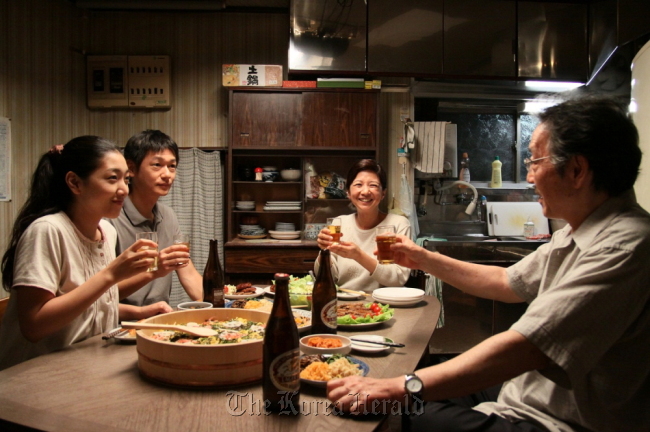 |
A scene from Yang Yong-hi’s film “Our Homeland” ( BIFF) |
Japanese-born director’s ‘Our Homeland’ delves into hardships of ethnic Koreans in Japan
BUSAN ― Japanese-born director Yang Yong-hi, who was in Korea last year with her personal documentary “Goodbye Pyongyang”― a cinematic account of her young niece who lives in Pyongyang, North Korea ― visited Busan with her first feature-length feature film, also based on her personal story of her unusual family.
Yang, who was born and grew up in Osaka and obtained her South Korean citizenship in 2004, says she has always struggled with her sense of belonging.
“I was born in Japan, have a South Korean citizenship, but grew up being told to call North Korea my ‘homeland,’” Yang said in a press meeting in Busan, Saturday. “But I’ve never even lived in North Korea.”
 |
Korean-Japanese director Yang Yong-hi speaks during a press meeting about her film “Our Homeland” at BIFF in Busan on Saturday. (Yonhap News) |
Originally from South Korea’s Jeju Island, Yang’s father suffered severe poverty in the 1960s in Japan. He became a pro-North Korean figure after receiving financial assistance from the communist state. He decided to send his three sons ― who were in their teens ― to Pyongyang in the ’70s, in support of a Japanese-Korean repatriation program jointly organized by Japan and North Korea. Yang’s three brothers are among the estimated 90,000 ethnic Koreans from Japan who were repatriated to the communist state from the late 1950s to the 1970s.
“Even the Japanese media propagated the myth of North Korea being some kind of a paradise,” Yang told reporters. “At the time, South Korea was politically unstable. My parents were among those who did not trust the South Korean government, especially because they had to leave their native Jeju after the Jeju uprising in 1948. The biggest tragedy of those who moved to North Korea is that they don’t have any choice but to stay there.”
The film, “Our Homeland,” is based on her reunion with her brother in 1999. It tells the story of Sung-ho, who returns briefly to visit his family and receive medical treatment for his brain tumor after 25 years of living in North Korea. Ever since moving to the communist state, he’d been relying on money and packages of supplies sent from his mother in Japan.
Filmmaker-actor Yang Ik-june, who is well known for his 2009 autobiographical film “Breathless,” stars as a North Korean agent who accompanies and observes Sung-ho during his visit to Tokyo. It was the filmmaker-actor who advised the director to change one of the scenes in the movie, where Sung-ho says goodbye to his family and gets into the car with the agent. In the emotional moment, Rie, a stand-in for director Yang’s younger self, grabs the door of the car in an effort to stop her brother from leaving.
“When it actually happened, I was just standing there, and saw the car leaving,” director Yang said, tearing up at the memory. “I initially filmed the version which was exactly the same as what had happened in real life. And I saw myself being angry. I’d been regretful that I didn’t do anything at the time, and that I never got to tell him that I didn’t want him to leave. And Mr. Yang told me that you can do what you couldn’t do in reality in your movies. So I asked actress Ando Sakura, who played my younger self in the movie, to somehow express that feeling, the feeling of not wanting to lose him, without giving any directions. And the scene is what I got from Sakura, which I am very satisfied with.”
When asked about her brothers who still live in North Korea, Yang said she worries about their safety every night.
“I used to worry more when I made my previous documentaries,” she said. “But now, I hope that the North Korean government will leave them alone once they become more famous.”
Previously featured at this year’s Berlinale, “Our Homeland” has been also selected as one of Japan’s Academy Award foreign-language submissions.
By Claire Lee (
dyc@heraldcorp.com)









